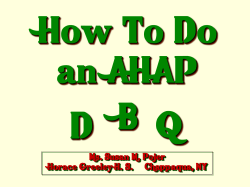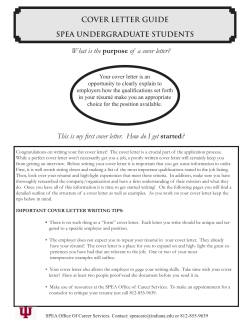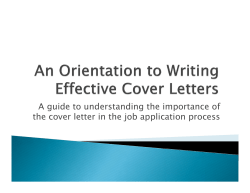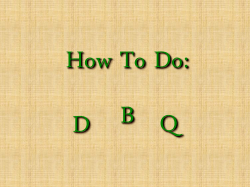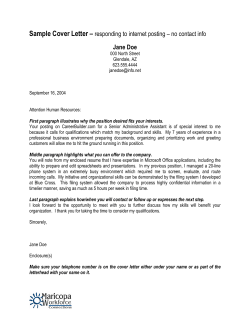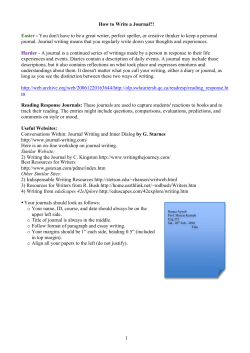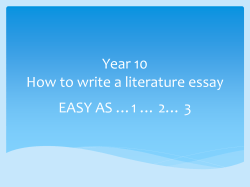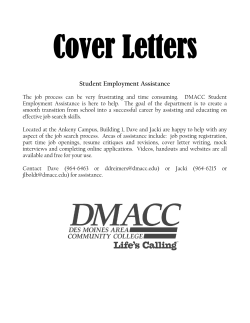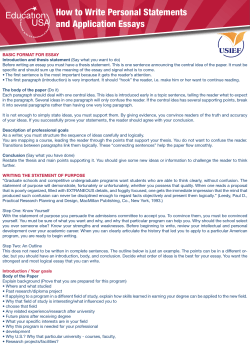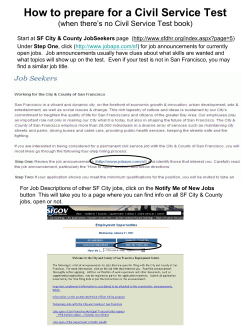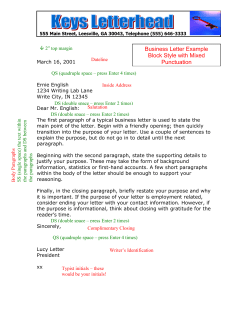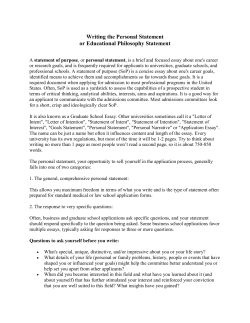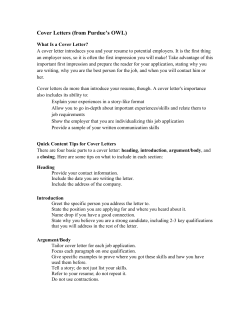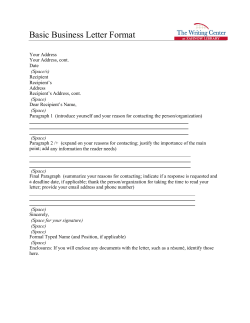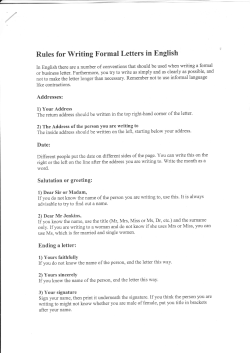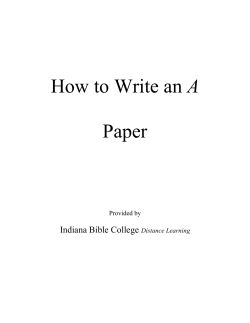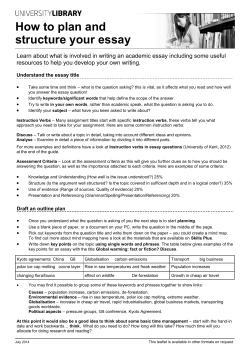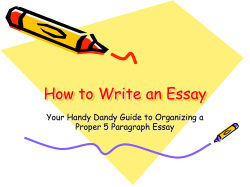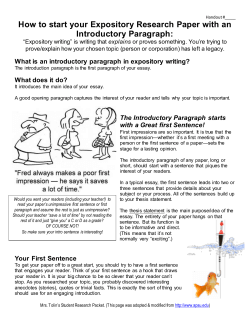
Write a First Draft
Write a First Draft After you have collected and reviewed these materials, it is time to start writing. The following is a list of concerns that writers should keep in mind when writing a personal statement or application letter. Answer the Question A major problem for all writers can be the issue of actually answering the question asked. For example, an application might want you to discuss the reason you are applying to a particular program or company. If you spend your entire essay or letter detailing your qualifications without mentioning what attracted you to the company or department, your statement probably will not be successful. To avoid this problem, read the question or assignment carefully both as you prepare and again just prior to writing. Keep the question in front of you as you write, and refer to it often. With application letters, the question is implicit: “Who are you, and why should you be considered for this job?”. Consider the “I” Problem This is a personal statement; using the first person pronoun I is acceptable. Writers often feel rather selfconscious about using the first person excessively, either because they are modest or because they have learned to avoid first and second person (I and you) in any kind of formal writing. Yet in this type of writing using first person is essential because it makes your prose more lively. Using third person can result in a vague, wordy essay. Don’t start every sentence with I, but remember that you and your experiences are the subject of the essay. Avoid Unnecessary Duplication Some writers repeat information in their personal statements that is already included in other parts of the application packet (resume, transcript, application form, etc.). However, it isn’t necessary to include specific information such as your exact GPA in your personal statement. It is more efficient and effective to simply mention academic progress briefly (“I was on the Dean’s List” or “I have taken numerous courses in the field of nutrition”) and then discuss appropriate work or volunteer experiences in more detail. Make Your Statement Distinctive Many writers want to make their personal statements unique or distinctive in some way as a means of distinguishing their application from the many others received by the company or program. One way to do this is to include at least one detailed example or anecdote that is specific to your own experience— perhaps a description of an important family member or personal moment that influenced your decision to pursue a particular career or degree. This strategy makes your statement distinctive and memorable. Keep it Brief Personal statements are usually limited to 250–500 words or one typed page, so write concisely while still being detailed. Make sure that each paragraph is tightly focused on a single idea (one paragraph on the strengths of the program, one on your research experience, for example) to help keep the essay from becoming too long. Also, spend a little time working on word choice using a dictionary and a thesaurus, and include adjectives for more vivid and precise writing. Organize Your Statement As mentioned before, the requirements for personal statements differ, but generally a personal statement includes certain information and can follow this format (see sample below). Introduction Many personal statements begin with a catchy opening, often the distinctive personal anecdote mentioned earlier, as a way of gaining the reader’s attention. From there you can connect the example to the actual program or position for which you are applying. Mention the specific name of the program or company, as well as the title of the position or degree you are seeking, in the first paragraph. Detailed supporting paragraphs Subsequent paragraphs should address any specific questions from the application, which might deal with the strengths of the program or position, your own qualifications, your compatibility with the program or position, your long-term goals, or some combination thereof. Each paragraph should be focused and should have a topic sentence that informs the reader of the paragraph’s emphasis. You need to remember, however, that the examples from your experience must be relevant and should support your argument about your qualifications. Conclusion Tie together the various issues that you have raised in the essay, and reiterate your interest in this specific program or position. You might also mention in a closing paragraph how this job or degree is a step toward a longterm goal. An application letter may contain many of the same elements as a personal statement, but it is presented in a business letter format and can sometimes be even shorter and more specific than a personal statement. An application letter may not contain the catchy opening of the personal statement but instead includes detailed information about the program or position and how you found out about it. Your application letter usually refers to your resume at some point. Another difference between a personal statement and an application letter is in the conclusion, which in an application letter asks for an interview. Allow Time for Revision Because this piece of writing is designed to get you either an interview or a place in a graduate school program, it is vital that you allow yourself enough time to revise it thoroughly. This revision needs to occur on both the content level (did you address the question? is there enough detail?) and the sentence level (is the writing clear? are the mechanics and punctuation correct?). While tools such as spell-checkers and grammar-checkers are helpful during revision, they should not be used exclusively; you should read over your draft yourself. Have others do so as well. Sample The following sample is a personal statement like one that might be included in an application for admission to a graduate MBA program. The writer is responding to instructions which state, “Describe your background, work experiences, and career goals. How will admission to IU’s MBA program help you fulfill those goals?” Note the specific details she includes about her work experiences, and how she relates her background to her career goal. As a child I often accompanied my father to his small coin shop and spent hours watching him work. When I was older, I sometimes set up displays, waited on customers, and even balanced the books. This experience instilled in me the desire to own and manage my own business someday, yet I understand that the business world today is complex. This complexity requires more education, and with that in mind, I am applying to the Master of Business Administration (MBA) program at Indiana University Bloomington (IUB). In addition to helping out in my father’s business, I have had numerous other work experiences that further enhance my qualifications for this program. My resume enumerates the various positions I have held at Kerasotes Theaters, Chili’s restaurants, and IU’s new Student Recreational Sports Center (SRSC), all of which have emphasized serving the public effectively. As an assistant manager at the movie theater and a staff coordinator at the SRSC, I have valuable expertise in managing employees and creating work schedules. Both of these positions have allowed me to develop my sales and people skills, which are extremely important in an increasingly service-driven marketplace. Not all of my work experience has been as a paid employee. Part of my experience as a volunteer at Middle Way House, the local battered women’s shelter, involved extensive work on computers, including word processing, organizing databases, and creating spreadsheets. Also, I recently participated in an internship program for academic credit with the Eli Lilly Corporation in its personnel division. As a management intern, I was able to watch the workings of a major corporation up close. I would like the opportunity to combine my practical experiences with the theoretical background available in the MBA program at IUB, with its emphasis on computers, marketing, and human resources. My successful internship is one element of my overall academic success as an undergraduate here at IUB, yet I have also made time for a variety of extracurricular activities, including working for my sorority and competing in intramural basketball. My positive experiences here have resulted in my desire to stay in Bloomington to continue my academic endeavors; furthermore, continuing my education here would allow me to make important business contacts as I move toward my career goal of opening a computer consulting firm in the Midwest. Writing Personal Statements and Application Letters The process of applying for jobs, internships and graduate/professional programs often requires a personal statement or application letter. This type of writing asks writers to outline their strengths confidently and concisely, which can be challenging. Though the requirements differ from application to application, the purpose of a personal statement is to represent your goals, experiences and qualifications in the best possible light, and to demonstrate your writing ability. Since your statement or application letter introduces you to your potential employer or program director, it is essential that you allow yourself enough time to craft a polished piece of writing. Prepare Your Materials For free help at any stage of the writing process: Writing Tutorial Services Wells Library Information Commons Indiana University 855-6738 www.indiana.edu/~wts/ See our website for hours, times, and locations Revised 08/11/11 Before you sit down to write, do some preparation in order to avoid frustration during the actual writing process. Obtain copies of documents such as transcripts, resumes and the application form itself; keeping them in front of you will make your job of writing much easier. Make a list of important information, in particular names and exact titles of former employers and supervisors, titles of jobs you have held, companies you have worked for, dates of appropriate work or volunteer experiences, and the duties involved. In this way, you will be able to refer to these materials while writing in order to include as much specific detail as possible.
© Copyright 2025


